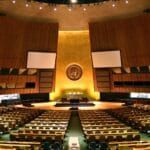Australia’s nuclear dilemma
By Fissile Materials Working Group | July 12, 2012
“What will make a focus on nuclear security a permanent feature of what we do?” asked Australian Prime Minister Julia Gillard at the 2012 Nuclear Security Summit held in Seoul in late March. Experts agree that the 2014 summit must go further in securing nuclear materials from disasters and, most important, terrorist threats — but agreement on precisely how to do this is harder to come by. In this regard, Australia has much to offer.
Though much of the world may not realize it, Australia has a superlative record in nuclear security. A recent international report by the Nuclear Threat Initiative, the NTI Nuclear Materials Index, placed Australia first in nuclear security and control out of 32 states with weapons-usable nuclear materials. In addition, the country fulfilled key promises it made at the 2010 Nuclear Security Summit — such as passing the Nuclear Terrorism Amendment Act of 2011, which allows Canberra to ratify the International Convention for the Suppression of Acts of Nuclear Terrorism.
More important, as leaders around the globe prepare for the 2014 nuclear security summit in the Netherlands, Australia has offered promising and forward-looking ideas for invigorating the nuclear security agenda. At the 2012 summit, Prime Minister Gillard argued that nuclear security must occupy a permanent spot on state agendas, rather than only surfacing once every two years for a summit. To achieve this, the Australian leader proposed three specific and actionable ideas to create an enduring space for nuclear security in policy-maker portfolios.
The Australian plan. Experts around the world agree that when it comes to nuclear security, the International Atomic Energy Agency (IAEA) lacks much-needed authority and resources. The question is, how does it get there? Gillard called for innovative thinking to strengthen the IAEA. And her fellow Australian Trevor Findlay, senior fellow at the Centre for International Governance Innovation, published a comprehensive report last month detailing recommendations on how to bolster the watchdog agency. If other states heed Canberra’s call for innovation, the whole world can reap the results of greater transparency, accountability, and authority from the IAEA.
Next, Gillard recommended creating an accountability framework to build confidence in states’ nuclear security. Gillard suggested that summit nations take on “regular peer reviews of our domestic nuclear security arrangements that would ensure ongoing transparency and keep each of us, and all of us, on our toes, which is where we should be as we deal with this challenge.”
The idea is both provocative and worthwhile. Typically, mandating requirements for greater transparency — such as the IAEA Additional Protocol — are met with resistance, in particular from those who believe increasing obligations on non-nuclear weapons states is unfair. But Gillard’s proposal elegantly sidesteps this concern, as it is neither mandatory nor hierarchical. Though voluntary, a peer-review system agreed to by even a few committed states could increase nuclear security for all. After peer reviews, participating states would be more likely to find and patch holes in their nuclear security systems. Then the common lessons and best practices gleaned from the reviews could be shared with all states, not just those in the peer-review system. Finally, by showcasing the importance of nuclear security and the successful effects of international dialogue on innovative security strategy, a peer-review network would likely persuade non-participating states to reconsider joining. The IAEA or an organization like the World Institute for Nuclear Security could help by facilitating the establishment and record-keeping of such a peer-review process.
Finally, Gillard recommended that states and other interested parties forge links with business to support nuclear security. She argued, “There are major corporations who play a role in the nuclear industry, and to the extent that we can further collaboration with them, then I think we would further our ambitions for nuclear security.” Again, the Australian proposition makes sense. Many of the key agreements designed to decrease risks from weapons of mass destruction — including UN Security Council Resolution 1540, the Chemical Weapons Convention, and the Biological Weapons Convention — involve extensive outreach and cooperation with private industry. While state regulatory frameworks are essential in improving nuclear security, many of the players in the nuclear industry are private businesses; engaging with them is critical for success. In addition, industry experts can help develop creative technical strategies for strengthening nuclear security.
In addition to advocating these steps, Gillard announced that Australia will hold its own nuclear security summit for countries in its region — Southeast Asia — which will allow for a deeper discussion of the specific security challenges and solutions in that area. Scheduled for 2013, the summit will engage Southeast Asian countries in delineating the region’s top priorities for nuclear security. This is an excellent way to continue to keep nuclear security at the top of Southeast Asia’s agenda — however, Gillard should go even further. The prime minister should take the occasion as an opportunity to ensure that the agenda reflects her three security proposals. The region could deliberate about the best ways to strengthen the IAEA, and nuclear industry representatives should be invited to participate alongside the states. Most important, the summit could investigate the possibility of a regional nuclear security peer-review system; with Australia’s top spot in the Nuclear Threat Initiative ranking, Canberra would be in an excellent position to lead and to serve as a regional model for a potentially successful global model.
The India problem. Despite Australia’s impressive contributions to global nuclear dialogue, recent Australian actions may actually undermine efforts to promote nuclear nonproliferation and security: in particular, the Gillard government’s decision to sell uranium to India. India is only one of four countries that do not belong to the Nuclear Nonproliferation Treaty; India also refuses to sign the Comprehensive Test Ban Treaty, reserving the right to conduct environmentally destructive nuclear tests. In addition, India is locked in a nuclear arms race with Pakistan — and the human and environmental consequences of a nuclear war in South Asia would be incalculable.
Supporters of uranium sales from Australia to India meanwhile argue that, because uranium sales to India in general are now approved by the international Nuclear Suppliers Group (due to a push from the United States), India will simply acquire uranium from other countries if Australia does not sell it to them.
However, Australia’s well-earned reputation for leadership in nuclear disarmament and nuclear security may be tarnished if Canberra continues to sell uranium to a country outside the global nonproliferation framework. After all, India is currently producing fissile material to increase its nuclear weapons stocks; how then can Australia maintain its credibility when expressing concern over Israeli, North Korean, Pakistani, or potentially Iranian nuclear weapons? Domestic and international experts have argued that Australian sales of uranium to India might even be illegal, because they violate the South Pacific Nuclear-Free Zone Treaty. While not all agree with this interpretation, the fact remains that Australia now faces the perception of being a country that undermines and violates disarmament treaties.
Most important, Australia’s uranium sales to India directly relate to nuclear security. While proponents of uranium sales to India argue that New Delhi is a responsible nuclear power, new findings indicate that India was a customer of the illegal nuclear sales network run by Pakistani nuclear scientist A.Q. Khan. Additionally, India’s record on nuclear security is weak. The Nuclear Security Index — which ranked Australia No. 1 — listed India at No. 28 out of 32, giving low marks in a number of areas, including transparency, independent regulation, corruption, and physical security during transport. Nuclear materials have turned up unexpectedly in India’s scrap yards and have been accidentally mixed with a community’s drinking water supply. Independent experts are questioning whether India is capable of securing nuclear materials from terrorists.
Nuclear security is too important to overlook, and Australia’s proposals for strengthening it are worthwhile. However, concern over uranium sales to India could threaten the country’s leadership, reducing the credibility and clarity of its otherwise strong voice.
Maria Rost Rublee is senior lecturer in international relations at the Australian National University. She is author of the award-winning book Nonproliferation Norms: Why States Choose Nuclear Restraint and a member of the international Fissile Material Working Group.
Together, we make the world safer.
The Bulletin elevates expert voices above the noise. But as an independent nonprofit organization, our operations depend on the support of readers like you. Help us continue to deliver quality journalism that holds leaders accountable. Your support of our work at any level is important. In return, we promise our coverage will be understandable, influential, vigilant, solution-oriented, and fair-minded. Together we can make a difference.
Topics: Columnists, Nuclear Weapons















